Celebrating 8 Years of Podcasting
/Both Books and Ideas and the Brain Science Podcast were launched in 2006. This post includes a list of all the episodes posted in 2014.
Read More| ABOUT | SHOW NOTES | EPISODE LIST | GUEST LIST | TRANSCRIPTS | BIBLIOGRAPHY |
|---|
Both Books and Ideas and the Brain Science Podcast were launched in 2006. This post includes a list of all the episodes posted in 2014.
Read MoreIn July 2014 I started a Fellowship in Palliative Medicine. Episode 56 of Books and Ideas is an interview with Dr. Amos Bailey, a respected pioneer in the field.
Read MoreEpisode 55 of Books and Ideas is an interview with Dr. John Ratey, co-author of Go Wild: Free Your Body and Mind from the Afflictions of Civilization. Dr. Ratey has also been featured several times on the Brain Science Podcast. He is an expert on the brain benefits of exercise.
Read More
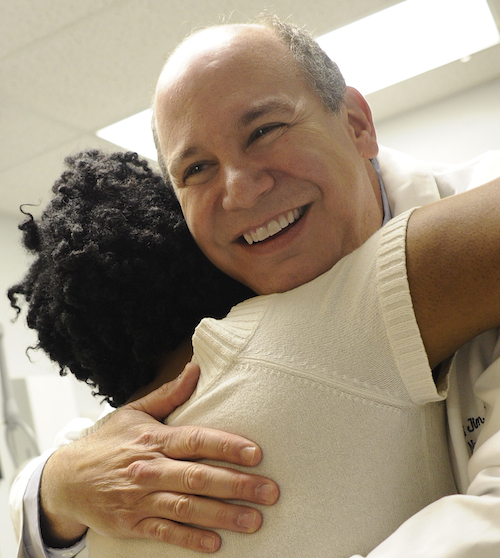 Michael Sagg, MD (click to listen)Episode 54 of Books and Ideas is an interview with Dr. Michael Saag, one of the pioneers in the battle against HIV-AIDS and author of the provocative new book Positive: One Doctor's Personal Encounters with Death, Life, and the US Healthcare System. When I asked him why he wrote his book he said bluntly "Because I am angry!"
Michael Sagg, MD (click to listen)Episode 54 of Books and Ideas is an interview with Dr. Michael Saag, one of the pioneers in the battle against HIV-AIDS and author of the provocative new book Positive: One Doctor's Personal Encounters with Death, Life, and the US Healthcare System. When I asked him why he wrote his book he said bluntly "Because I am angry!"
Saag shares the frustration of most American physicians who struggle with the current chaos that we call a healthcare "system." As he notes on page 2 of Positive, “over three decades of unparalleled advances in science and healing, so much about practicing medicine seems to have gotten worse. Medical professionals’ time with patients has decreased while the workload had increased. The cost of patient care has risen by every measure, while insurers appear to profit more and help less.”
In Positive Dr. Saag blends the inside story of how HIV-AIDS was transformed from a death sentence to a manageable chronic medical condition with a candid discussion of our sytems failings. He recognizes that those of us who want to see real change face an uphill battle against powerful, (and rich) entrenched interests who are profiting from the current chaos, but it is his hope that Positive will motivate physicians and patients to use the actvisim that helped spur success against AIDS as an inspiration to fight together for change.
Listen to Episode 54 of Books and Ideas
Episode Transcript (Download PDF)
 The latest episode of Books and Ideas (BI 53) is an interview with Rebecca Hale, president of the American Humanist Association. We explore the basic tenets of humanism and also discuss the particular challenges facing humanists in the United States.
The latest episode of Books and Ideas (BI 53) is an interview with Rebecca Hale, president of the American Humanist Association. We explore the basic tenets of humanism and also discuss the particular challenges facing humanists in the United States.
Hale describes humanism as "a life philosophy based on personal responsibility: humans made the problems in the world, and it's up to us to take responsibility to fix them, so that we leave the planet better than we found it."
Listen to Episode 53 of Books and Ideas (right click to download mp3)
Free Episode Transcript (Download PDF)
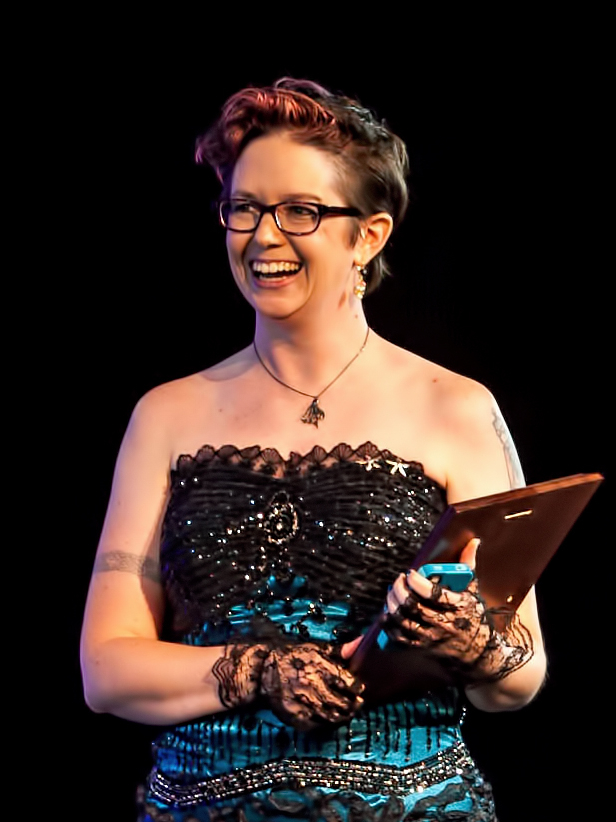 Mur Lafferty (photo by Philip Peterson)Mur Lafferty inspired me to start podcasting back in 2006, so I am very proud that she recently won the prestigious John W. Campbell Award at this year's Hugos Celebration. Her latest novel The Shambling Guide to New York City is also garnering well-deserved praise.
Mur Lafferty (photo by Philip Peterson)Mur Lafferty inspired me to start podcasting back in 2006, so I am very proud that she recently won the prestigious John W. Campbell Award at this year's Hugos Celebration. Her latest novel The Shambling Guide to New York City is also garnering well-deserved praise.
Mur was my guest way back in Episode 17 of my Books and Ideas podcast so I am very pleased to have her back on for Episode 52. We talked about her writing career and what she has learned along the way. Mur continues to produce her long-running podcast I Should Be Writing, which is a must listen for all aspiring fiction writers.
Listen to Episode 52 of Books and Ideas
Episode Transcript (Download PDF)
 Dr. Jaak Panksepp (click for audio)Episode 51 of Books and Ideas is actually a followup of Dr. Jaak Panksepp's recent interview on the Brain Science Podcast. There we talked in depth about the scientific evidence that humans share basic emotional circuitry with other mammals. In this interview we talk about the implications of this discovery, focusing on how it should impact the treatment of laboratory animals. We also consider our relationships with pets and other domestic species.
Dr. Jaak Panksepp (click for audio)Episode 51 of Books and Ideas is actually a followup of Dr. Jaak Panksepp's recent interview on the Brain Science Podcast. There we talked in depth about the scientific evidence that humans share basic emotional circuitry with other mammals. In this interview we talk about the implications of this discovery, focusing on how it should impact the treatment of laboratory animals. We also consider our relationships with pets and other domestic species.
Listen to Episode 51 of Books and Ideas
Episode Transcript (Download Free PDF)
 Ted Meisner (click to listen)I recently had the opportunity to be a guest on The Secular Buddhist podcast, which is hosted by Ted Meisner. We talked about neuroscience and my new eBook Are You Sure? The Unconscious Origins of Certainty. I enjoyed learning about the Secular Buddhist Association, which is an outgrowth of the podcast, but I was surprised that listener feedback indicated that many listeners have a poor understanding of Buddhism and how it relates to Secularism. That is why I invited Meisner to come on my Books and Ideas podcast.
Ted Meisner (click to listen)I recently had the opportunity to be a guest on The Secular Buddhist podcast, which is hosted by Ted Meisner. We talked about neuroscience and my new eBook Are You Sure? The Unconscious Origins of Certainty. I enjoyed learning about the Secular Buddhist Association, which is an outgrowth of the podcast, but I was surprised that listener feedback indicated that many listeners have a poor understanding of Buddhism and how it relates to Secularism. That is why I invited Meisner to come on my Books and Ideas podcast.
I have just posted this interview as Episode 50:
![]() Listen to Episode 50 of Books and Ideas
Listen to Episode 50 of Books and Ideas
Episode Transcript (Download FREE PDF)
Subscribe to Books and Ideas Podcast: ![]()
![]()
![]()
![]()
Emily Reese (Photo by Nate Ryan) Episode 49 of Books and Ideas is an interview with Emily Reese from Minnesota Public Radio. Reese is the host of two podcasts that I enjoy: Top Score and Learning to Listen. In this interview we focus on Top Score, which is a podcast about video game music. Reese interviews the composers and gives listeners an inside look at the challenges that face composers in this new, but growing field. You don't need to be a musician or a gamer to enjoy Emily's podcasts.
Listen to Episode 49 of Books and Ideas
Free Episode Transcript (Download PDF)
Be sure to see the free episode transcripts for links to all the composers mentioned in the podcast.
If you enjoy video games and/or good science fiction check out Books and Ideas #44 with author Karen Traviss.
All music clips in this episode comply with the 30 second limit for Fair Use.
Click here for a full list of the music used or see the free episode transcript.
Please post your comments on the Books and Ideas Fan Page on Facebook or on Google+. You can also post to the Brain Science Podcast Discussion Forum at Goodreads.com.
Next month's Books and Ideas is an interview with Ted Meissner who is the host of The Secular Buddhist podcast. In the meantime you might want to check out my interviews on his show: ep 124 and ep 133
I also plan to interview Jaak Panksepp. We will be talking about how discoveries from affective neuroscience should influence the treatment of laboratory animals.
Send me email at gincampbell at mac dot com or follow me on Twitter (@docartemis).
Sign up for my newsletter to automatically receive the show notes for both Books and Ideas and the Brain Science Podcast.
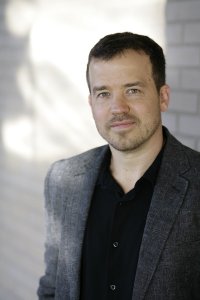 Jonathan GottschallWhat do fiction, dreams, and children's make believe have in common? Why is storytelling found in every human culture? These are among the fascinating questions explored in The Storytelling Animal: How Stories Makes Us Human by Jonathan Gottschall.
Jonathan GottschallWhat do fiction, dreams, and children's make believe have in common? Why is storytelling found in every human culture? These are among the fascinating questions explored in The Storytelling Animal: How Stories Makes Us Human by Jonathan Gottschall.
I have just posted an interview with Jonathan Gottschall (Books and Ideas #48) in which we talk about some of the key ideas in his new book. Gottschall's goal is to look for clues about why storytelling is such an universal behavior. He also argues that it should be possible to form testable theories about the purpose of storytelling.
![]() Listen to Episode 48 of Books and Ideas
Listen to Episode 48 of Books and Ideas
Episode Transcript (Download Free PDF)
Subscribe to Books and Ideas Podcast: ![]()
![]()
![]()
![]()
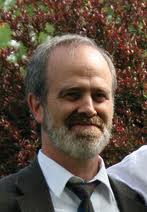 Terrence Deacon, PhDIn his new book Incomplete Nature: How Mind Emerged from Matter Terrence Deacon writes that his goal is “demonstrate how a form of causality depending specifically on absent features and unrealized potential can be compatible with our best science.” (page 16). But in a recent interview (Books and Ideas #47) he also contends that his book "grew out of a dissatisfaction with the systems theory approach." He feels strongly that "to understand the origin of end-directed phenomena, representational phenomena, or mental phenomena, you need to take one further step; you need to figure out what’s beyond self-organization that needs to be explained to account for these things." Thus, his ambitious goal is to find a place for meaning within in science.
Terrence Deacon, PhDIn his new book Incomplete Nature: How Mind Emerged from Matter Terrence Deacon writes that his goal is “demonstrate how a form of causality depending specifically on absent features and unrealized potential can be compatible with our best science.” (page 16). But in a recent interview (Books and Ideas #47) he also contends that his book "grew out of a dissatisfaction with the systems theory approach." He feels strongly that "to understand the origin of end-directed phenomena, representational phenomena, or mental phenomena, you need to take one further step; you need to figure out what’s beyond self-organization that needs to be explained to account for these things." Thus, his ambitious goal is to find a place for meaning within in science.
Incomplete Nature is a dense but compelling book, and the goal of this interview is to introduce listeners to the idea that life and meaning are compatible with a scientific world view.
Free Episode Transcript (Download PDF)
Subscribe to Books and Ideas Podcast: ![]()
![]()
![]()
![]()
 Roger ReidRoger Reid has a job that every kid and most adults would find fascinating. He works for the Alabama Museum of Natural History and travels all over Alabama as a writer and producer for the Emmy Award winning TV show, Discovering Alabama with Dr. Doug Phillips . He also shares his passion for natural history in a series of novels written for middle school age readers. I decided to interview him for Books and Ideas because I wanted to share these novels with my listeners. They combine mystery and science in an original way, but they also contain compelling characters that readers will care about.
Roger ReidRoger Reid has a job that every kid and most adults would find fascinating. He works for the Alabama Museum of Natural History and travels all over Alabama as a writer and producer for the Emmy Award winning TV show, Discovering Alabama with Dr. Doug Phillips . He also shares his passion for natural history in a series of novels written for middle school age readers. I decided to interview him for Books and Ideas because I wanted to share these novels with my listeners. They combine mystery and science in an original way, but they also contain compelling characters that readers will care about.
Episode 46 of Books and Ideas is an unusual episode because we don't just talk about Reid's novels. We also explore some of the little known treasures of Alabama's natural history. I guarantee surprises, even for those of you who call Alabama home. But I also hope that listeners around the world will gain a new appreciation for the natural resources of Alabama.
![]() Listen to Episode 46 of Books and Ideas
Listen to Episode 46 of Books and Ideas
Episode Transcript (Download PDF)
Subscribe to Books and Ideas Podcast: ![]()
![]()
![]()
![]()
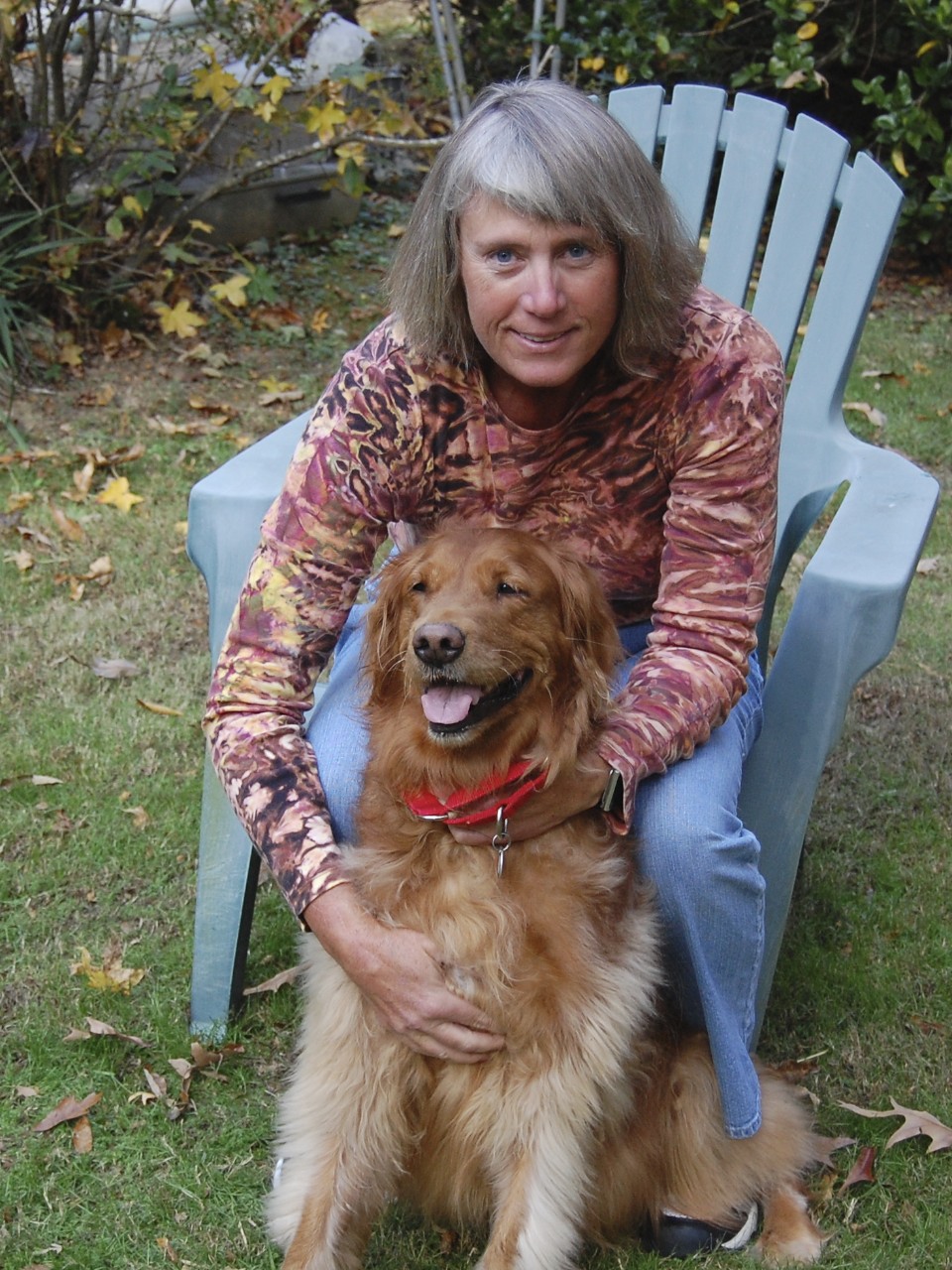 Ginger Campbell and GretaIn December 2006 I launched 2 podcasts: Books and Ideas and the Brain Science Podcast. In Episode 45 of Books and Ideas I take a few minutes to look back on my five years in podcasting and to thank some of my many guests.
Ginger Campbell and GretaIn December 2006 I launched 2 podcasts: Books and Ideas and the Brain Science Podcast. In Episode 45 of Books and Ideas I take a few minutes to look back on my five years in podcasting and to thank some of my many guests.
![]() Listen to Episode 45 of Books and Ideas
Listen to Episode 45 of Books and Ideas
Episode Transcript (Download Free PDF)
Subscribe to Books and Ideas Podcast: ![]()
![]()
![]()
![]()
The focus of this episode was to thank each of the 33 people who have been featured on Books and Ideas so far.
Click here for a complete list of guests (in alphabetical order).
Click here for a complete list of episodes.
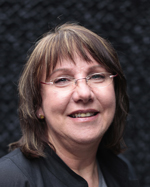 Karen TravissThe thing that draws me to novels by Karen Traviss is her characters and her recent series of novels based on the popular Gears of Wars videogame delivers a character-driven story of surprising depth. In fact, even though the recently released game Gears of War 3 (also written by Traviss) brings the games to an end, Traviss is still working on the 5th and final Gears of War novel, which is scheduled for release next spring.
Karen TravissThe thing that draws me to novels by Karen Traviss is her characters and her recent series of novels based on the popular Gears of Wars videogame delivers a character-driven story of surprising depth. In fact, even though the recently released game Gears of War 3 (also written by Traviss) brings the games to an end, Traviss is still working on the 5th and final Gears of War novel, which is scheduled for release next spring.
I was fortunate to interview Traviss last month, shortly after the release of Gears of War 3. The interview is spoiler free, but even if you don't play video games this interview will give you a new insight the role of writing in this emerging genre.
![]() Listen to Karen Traviss (BI 44)
Listen to Karen Traviss (BI 44)
Episode Transcript (Free PDF)
Subscribe to Books and Ideas Podcast: ![]()
![]()
![]()
![]()
![]() Listen to Karen Traviss (BI 44)
Listen to Karen Traviss (BI 44)
Episode Transcript (Free PDF)
Subscribe to Books and Ideas Podcast: ![]()
![]()
![]()
![]()
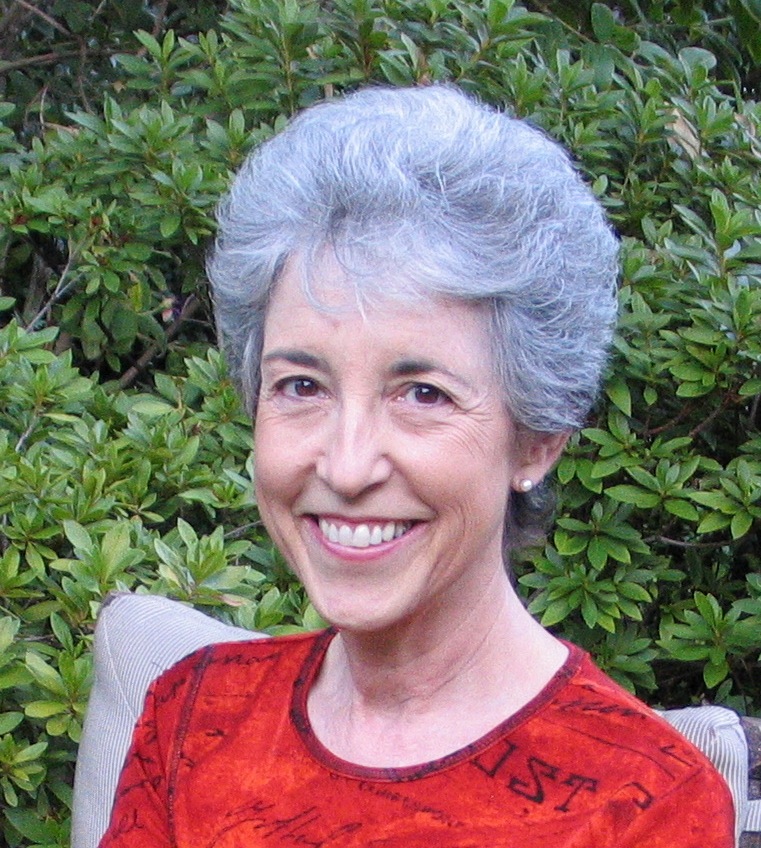 Carol Tavris, PhD Click for audioThe theory of cognitive dissonance is not new but Mistakes Were Made (But Not by Me): Why We Justify Foolish Beliefs, Bad Decisions, and Hurtful Acts by Carol Tavris and Elliot Aronson makes cognitive dissonance accessible to everyone, and, more importantly, Tavris and Aronson make it clear why we should care. As Dr. Tavris explained in a recent interview (Books and Ideas #43), "cognitive dissonance is a theory of blind spots." Appreciating how our brains automatically strive to decrease the discomfort we feel when faced with conflicting beliefs, can help us become aware of how these blind spots effect our behavior and attitudes.
Carol Tavris, PhD Click for audioThe theory of cognitive dissonance is not new but Mistakes Were Made (But Not by Me): Why We Justify Foolish Beliefs, Bad Decisions, and Hurtful Acts by Carol Tavris and Elliot Aronson makes cognitive dissonance accessible to everyone, and, more importantly, Tavris and Aronson make it clear why we should care. As Dr. Tavris explained in a recent interview (Books and Ideas #43), "cognitive dissonance is a theory of blind spots." Appreciating how our brains automatically strive to decrease the discomfort we feel when faced with conflicting beliefs, can help us become aware of how these blind spots effect our behavior and attitudes.
![]() Listen to Episode 43 of Books and Ideas
Listen to Episode 43 of Books and Ideas
Episode Transcript (Download PDF)
Subscribe to Books and Ideas Podcast: ![]()
![]()
![]()
![]()
Cognitive dissonance is also revelevant to anyone with an interest in science because as Dr. Tavris noted: "the scientific method is designed to create dissonance—in a way, we could say this. This is one of the reasons science is so unpopular—I should say is so difficult—because scientists are humans, and scientists don’t like it when their predictions are disconfirmed. But, you see, as we now understand, the mind is designed for consistency, for consonance; it’s designed to notice, and remember, and confirm evidence that supports our beliefs, and to forget and ignore information that is dissonant with our beliefs.
It’s such an interesting thing for those of us interested in skepticism and science, because the scientific method is designed to create dissonance—in a way, we could say this. This is one of the reasons science is so unpopular—I should say is so difficult—because scientists are humans, and scientists don’t like it when their predictions are disconfirmed. But, you see, as we now understand, the mind is designed for consistency, for consonance; it’s designed to notice, and remember, and confirm evidence that supports our beliefs, and to forget and ignore information that is dissonant with our beliefs."
Listener donations help make Dr. Campbell's podcasts possible.
![]() Listen to Episode 43 of Books and Ideas
Listen to Episode 43 of Books and Ideas
Episode Transcript (Download PDF)
 On May 11, 2011 Ginger Campbell, MD gave a talk entitled "Why Neuroscience Matters" at the London Skeptics in the Pub. Episode 42 of Books and Ideas is an edited version of that talk, including the lively Q and A with the audience.
On May 11, 2011 Ginger Campbell, MD gave a talk entitled "Why Neuroscience Matters" at the London Skeptics in the Pub. Episode 42 of Books and Ideas is an edited version of that talk, including the lively Q and A with the audience.
![]() Listen to Episode 42 of Books and Ideas
Listen to Episode 42 of Books and Ideas
Free Episode Transcript (Download PDF)
Subscribe to Books and Ideas Podcast: ![]()
![]()
![]()
![]()
Please send your feedback to Dr. Campbell at gincampbel at mac dot com, or post a comment on the Facebook Fan Page.
Don't forget to sign up for Ginger Campbell's Newsletter so you can get show notes for every podcast.
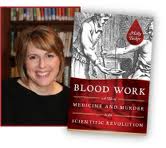 This month’s Books and Ideas podcast (#41) is an interview with Holly Tucker, author of Blood Work: A Tale of Medicine and Murder in the Scientific Revolution. Dr. Tucker’s book is about the first blood transfusions—which, surprisingly, occurred way back in the 1660’s; 150 years before the first successful human-to-human transfusions.
This month’s Books and Ideas podcast (#41) is an interview with Holly Tucker, author of Blood Work: A Tale of Medicine and Murder in the Scientific Revolution. Dr. Tucker’s book is about the first blood transfusions—which, surprisingly, occurred way back in the 1660’s; 150 years before the first successful human-to-human transfusions.
The thing that makes Blood Work compelling is that Dr. Tucker puts these early efforts into the context of their time, and she helps us to consider how these events could be relevant to the medical controversies of our own time. And, as we will allude to during our conversation, the story includes a fascinating murder mystery.
![]() Listen to Episode 41 of Books and Ideas
Listen to Episode 41 of Books and Ideas
Episode Transcript (Download PDF)
Subscribe to Books and Ideas Podcast: ![]()
![]()
![]()
![]()
Send feedback to Dr. Campbell at gincampbell at mac dot com or leave voice mail at 205-202-0663.
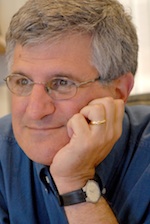 Paul Offit, MDIn his new book Deadly Choices: How the Anti-Vaccine Movement Threatens Us All pediatrican Dr Paul A. Offit traces the history of the anti-vaccine movement from opposition to the small pox vaccine in the 19th century up through recent events. Unfortunately, the results are predictable. Reducing vaccination rates lead to reemergence of dangerous preventable infectious diseases. That is why the decision not to vaccinate is not a personal decision. It is one that involves the whole community.
Paul Offit, MDIn his new book Deadly Choices: How the Anti-Vaccine Movement Threatens Us All pediatrican Dr Paul A. Offit traces the history of the anti-vaccine movement from opposition to the small pox vaccine in the 19th century up through recent events. Unfortunately, the results are predictable. Reducing vaccination rates lead to reemergence of dangerous preventable infectious diseases. That is why the decision not to vaccinate is not a personal decision. It is one that involves the whole community.
This is the focus of the conversation I had with Dr. Offit in Episode 40 of Books and Ideas. This is a follow-up to Dr. Offit's first interview here in Episode 25.
Because I think this issue is literally a matter of life and death, I encourage you to share this podcast with others.
Listen to Dr. Offit's interview (Books and Ideas #40)
Episode Transcript (Download PDF)
Subscribe to Books and Ideas Podcast: ![]()
![]()
![]()
![]()
Send email feedback to Dr. Campbell at gincampbell at mac dot com or leave voicemail at 205-202-0663.
Eric Maisel, PhDEric Maisel, PhD is a prolific author and his latest book Brainstorm: Harnessing the Power of Productive Obsessions challenges the assumption that all obsessions are bad. In Episode 39 of the Books and Ideas podcast we talk about how to cultivate what Maisel calls "productive obsessions." We also talk about the relationship between creativity and meaning. Dr. Maisel emphasizes the "necessary paradigm shift from seeking meaning to making meaning." Such a shift offers the possibility of making meaning out of any life circumstance.
Episode Transcript (Download PDF)
Links and References:
Eric Maisel, PhD: author and creativity coach
Brainstorm: Harnessing the Power of Productive Obsessions by Eric Maisel and Ann Maisel
The Atheist's Way: Living Well Without Gods by Eric Maisel
This month's pick from Audible.com: The Moral Landscape: How Science Can Determine Human Values by Sam Harris
Announcements:
The Books and Ideas podcast application is now available for Android
The Books and Ideas website is now hosted at /. Be sure to update your book marks.
This marks the 4th Anniversary of the Books and Ideas podcast. I intend to continue the show in 2011 on a reduced schedule. It will be on an alternate month schedule with the Brain Science Podcast. If you want to be notified about new episodes sign up for my newsletter.
The Brain Science Podcast was nominated as Best Science Podcast in the 2010 People's Choice Podcast Awards. The Winner was The Skeptics Guide to the Universe. SGU's host Dr. Steven Novella was interviewed on Books and Ideas back in episode 16.
Don't forget to join the Books and Ideas Fan Page on Facebook.
Send your feedback to gincampbell at mac dot com or leave voicemail at 205-202-0663.
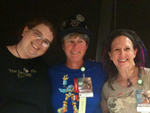 Books and Ideas Episode 38 was recorded live at Dragon*Con 2010, and it is an interview with novelists Skyler White (and Falling, Fly) and Christiana Ellis (Nina Kimberly the Merciless). Ellis and White talk about their work, and share lessons they have learned. This episode will be of particular interest to aspiring writers.
Books and Ideas Episode 38 was recorded live at Dragon*Con 2010, and it is an interview with novelists Skyler White (and Falling, Fly) and Christiana Ellis (Nina Kimberly the Merciless). Ellis and White talk about their work, and share lessons they have learned. This episode will be of particular interest to aspiring writers.
Listen to Episode 38 of Books and Ideas
Episode Transcript (Download PDF)
Subscribe to Books and Ideas Podcast: ![]()
![]()
![]()
![]()
Other Books and Resources:
Announcements: